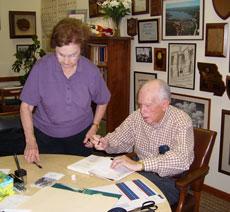40 Years Later

Warren Hearnes autographs a copy of his biography for Dr. Julio León as his wife, Betty, looks on
Forty years ago, as America waded through an ocean of evils – Vietnam, the Cuban Crisis, Watergate, the beginnings of the Cold War, its citizens struggled to forget the country’s mistakes and to find new identities.
Warren Hearnes, a young Representative from Southeast Missouri, joined the gubernatorial race as a democratic candidate.
During his campaign, Hearnes came to Joplin and met with William L. Webster, George A. Spiva and Fred G. Hughes who told him Southwest Missouri needed a four-year college and they were ready to work to get one. Hearnes promised them a four-year state college if they helped him become Governor.
“Everybody fights you,” Hearnes said, reminiscing about his push for Joplin. “But I made the pledge and never backed away from it.”
Since Southwest Missouri was a predominantly Republican area, Hearnes faces some political hurdles. Webster gave a speech in Joplin on Hearnes behalf and received tremendous applause. Hearnes was surprised that the people of Joplin were so quick to forget their party ties until Webster told him, “I didn’t tell them you were a Democrat.”
Hearnes won and in 1967 Governor Hearnes signed the legislation that made Missouri Southern State College a four-year institution, making good on his promise to the people of Joplin.
His Southern honesty was a staple characteristic throughout Hearnes’ political career.
“I don’t know of one promise that he didn’t follow through on,” said Betty, Warren’s wife of 59 years and a ten-year Representative in the Missouri Legislature. Betty, keen with memories of seemingly every detail of Warren’s time in the Governor’s office, tells of Warren, comfortable in his office chair, cigar in hand, listening to constituents’ needs and giving his answers.
“They knew when they came out of his office, if he said no, drop it,” Betty said. “If he said yes, he was gonna do it.” Even when campaigning, Warren and Betty Hearnes bypassed traditional strategies and, instead, drove themselves to all 114 counties in the state, meeting the people and giving speeches to groups of any size available. Often, Warren gave a speech every night of the week.
His connection with the people of Missouri is what set him apart from the other candidates, who sometimes seemed lofty in status compared with the common voters. “At a press conference in Newton County, Bush said, ‘I’m glad to be in MacDonald County,'” Warren remembered with a laugh. “I came back and told Betty, ‘Bet I carry Newton County! I may not know much, but I know what county I’m in.’ I never forgot that.”
Warren never lost that intimacy with his people while in the Governor’s office, and thus, in 1968 was reelected and became the first Missouri Governor to ever serve two consecutive terms.
While Governor, Warren’s major legislative focuses were education, mental health care and the arts.
Hearnes established four-year status for Missouri Western in St. Joseph. He channeled resources into the public educational system on every level, earning him a handful of buildings bearing his name including Hearnes Hall at Southern.
Ahead of his time, Warren’s push for mental healthcare was unheard of in America.
Warren revamped the entire mental healthcare system in Missouri, placing a regional clinic within an hour’s drive from every person in the state and building three intensive care centers. Missouri was the first state in the country to adopt this structure.
When Warren pushed for state support for the Missouri Council of the Arts, the other branches of government met him with doubts. “They thought you’d have naked ballet dancers running across the stage,” Betty said.
But lawmakers consented, making Missouri the second state to give financial support to an art commission.
Decades removed from his time in office, Warren now resides back in his hometown of Charleston, Mo, with his wife. Some years ago, she organized their memories – pictures, posters, calendars, awards – and placed them in a small storefront, which the city dubbed the Warren E. Hearnes Museum. The material for a recent biography, Warren E. Hearnes: A Memoir by Rob Crouse, came from museum resources. It serves as a sanctuary of fond reflection for a man that brought so much needed change to a state. Sitting beneath faded posters of his younger self with dignitaries from around the world, Warren concluded his recollections about his journey saying:”We will never forget it.”
Your donation will support the student journalists of Missouri Southern State University. Your contribution will allow us to purchase equipment and cover our annual website hosting costs.















